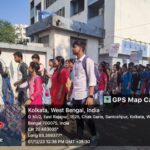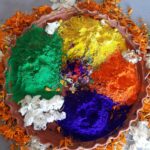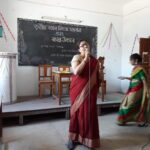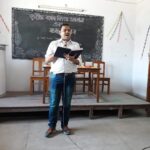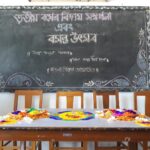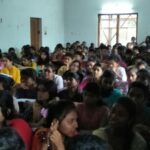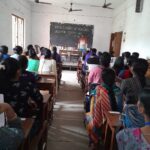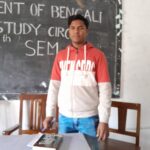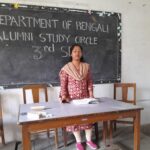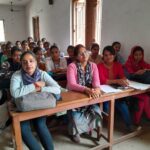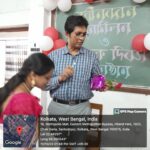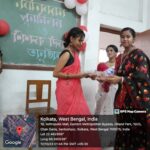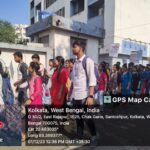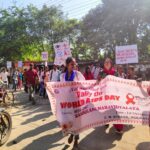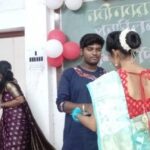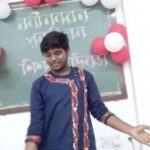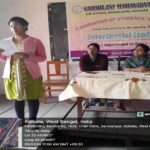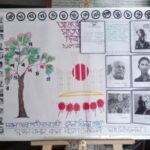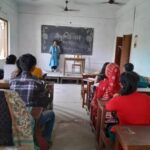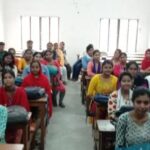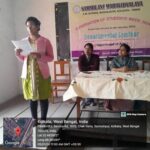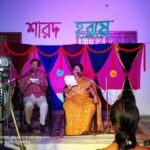- About the Department
- Faculty Profile
- Courses offered
- PO and CO
- Certificate / Add-on courses
- Teaching-learning
- Result and Student Progress
- Departmental Activities and Achievements
- Collaborative activities under MoU
- Alumni
- Photo Gallery
“The beauty of the Bengali language lies in its ability to express complex emotions and profound thoughts with simplicity and elegance.”
– Sarat Chandra Chattopadhyay
ABOUT
The Department of Bengali commenced its presence in this institution in 1996, with an initial enrollment of 3 students pursuing the General Course. In 2001, an Honors Course was introduced, with 25 students, out of which 12 achieved a first-class distinction. Over time, the intake capacity for the Honors Course expanded according to government regulations. Notably, the department boasts one of the highest rates of student enrollment in both the Honors and General Courses. Within the department, there are five dedicated instructors, two of them hold substantive positions while the other three are SACT. These educators are committed to nurturing their students’ academic and co-curricular growth. They actively engage students in various college activities, encouraging their involvement in maintaining the Departmental Wall-Magazine and participating in extension initiatives such as NSS, recitation, singing, dancing, and similar endeavors. The department initially followed the 3-year degree course under the 2+1 system and later transitioned to the 1+1+1 system of the University of Calcutta. In 2018, the department smoothly embraced the CBCS system.
VISION
Our vision is to support the holistic growth of our students. The Department is committed to delivering a high-quality educational environment. Recognizing that many students originate from economically disadvantaged backgrounds and suburban regions in South 24 Parganas, our aim is to empower them towards self-sufficiency. We aspire to cultivate a cohort of students who possess enhanced knowledge, improved skills, and increased economic independence.
MISSION
Our mission revolves around offering an optimal learning atmosphere to our students, ensuring ample opportunities for their academic growth. We aim to instill values that mold our students into capable individuals and self-sufficient members of society. Our efforts are dedicated to generating avenues through which they can acquire sound knowledge and skills. We consistently provide guidance to raise awareness among our students about the potential future opportunities associated with the field of Bengali.
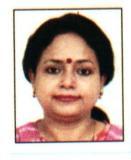
Dr. Ruma Chakraborti
Designation: Associate Professor
Email: rchakrabarti2014@gmail.com
Phone Number: 9903002348Get Detail »
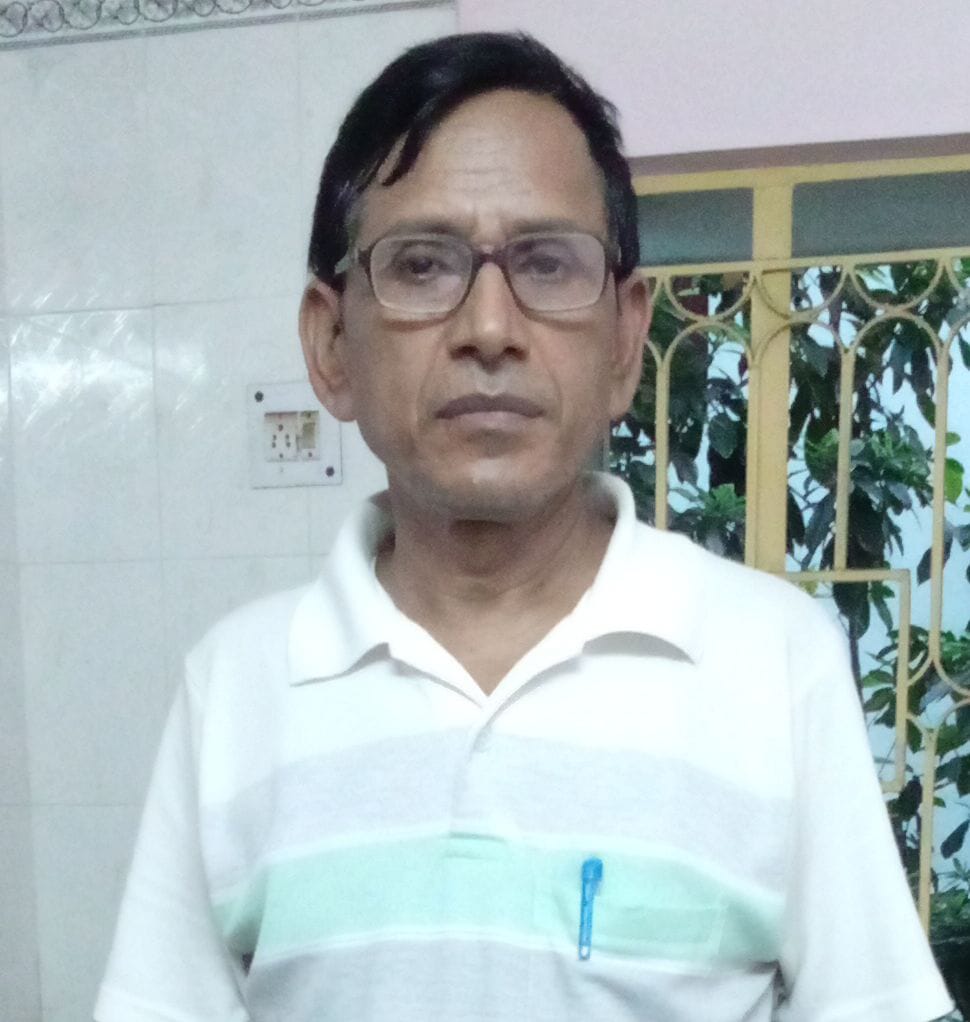
Dr. Mrinal Chandra Halder
Designation: Assistant Professor
Email:
Phone Number: 8167608772Get Detail »
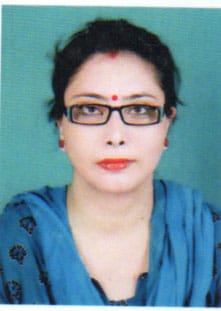
Smt. Panchali Mukherjee
Designation: State Aided College Teacher
Email: rchakrabarti2014@gmail.com
Phone Number: 7044250096Get Detail »
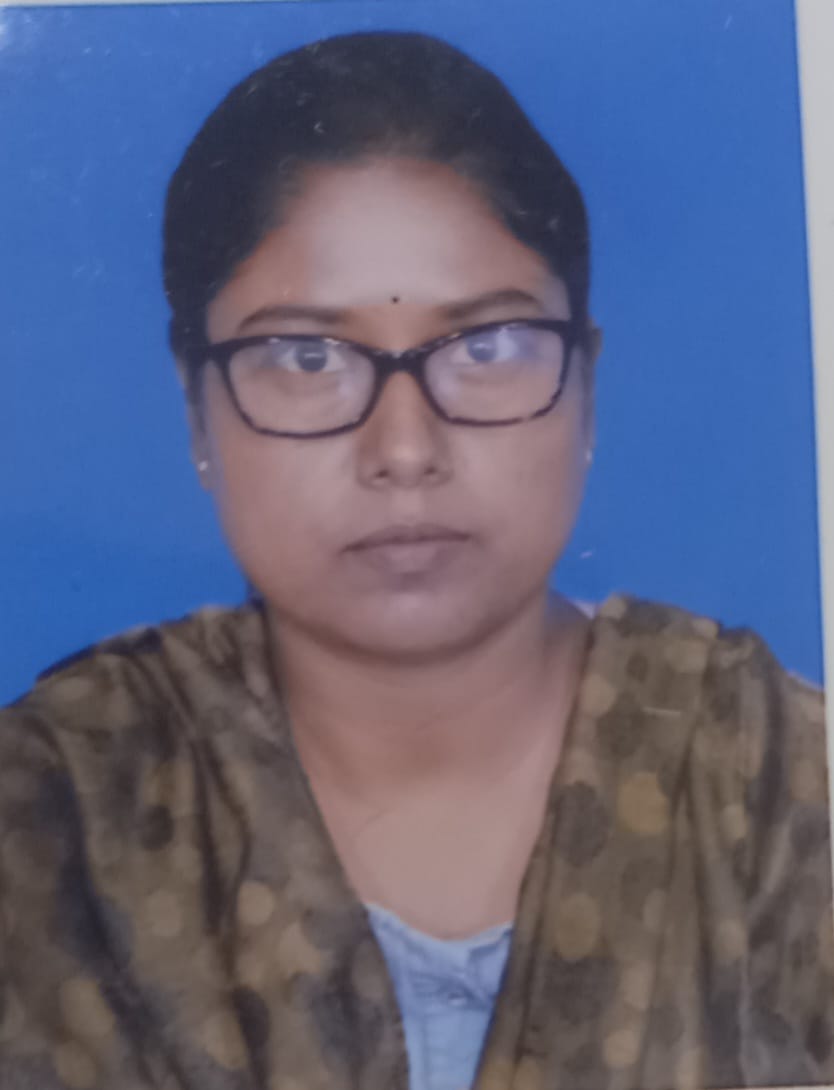
Dr. Sampa Mandal
Designation: State Aided College Teacher
Email: drsampa1984@gmail.com
Phone Number: 9903297110Get Detail »
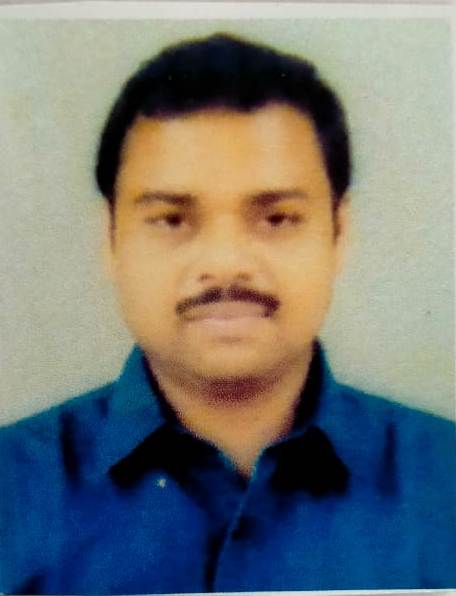
Sri Dibyendu Sarkar*
Designation: State Aided College Teacher
Email: punoscha40@gmail.com
Phone Number: 8420602841Get Detail »
As an affiliated college under the University of Calcutta, we strictly follow the curriculum prescribed by our parent University and the Department offers course options accordingly. Till 2018 we followed the three years’ Honours and General Degree courses under 1+1+1 system and offered both Honours and General courses in Bengali. In 2018 Semester system was introduced under Choice Based Credit Syatem (CBCS) and we continued to offer both Honous and Genearl Programmes in Bengali(BNGA & BNGG). In session 2023-24, NEP, 2020 was implemented by our Parent University and Curriculum and Credit Framework (CCF) for Undergraduate courses has been introduced. Currently the Department is following this system and is offering the courses as shown below:
| Courses Offered | Course code | Duration | Examination sysetm | Total Credits |
|
B.A. Major in Bengali (with research) |
BNGM | 4 years | Semester |
25X4 =100 credits
|
|
B.A Multidisciplinary (MDC) with Bengali |
MBNG | 3 years | Semester |
DSCC- 4×8=32 credits; SEC 4×1=4 credits; |
|
B.A Interdisciplinary (IDC) in BENGALI |
BNGD | 6 months (In any one semester of 1 or 2or 3) | Semester | 1X3=3 credits; |
Programme Outcomes
- Students will be Graduates with Bengali Honours degree after completing Bengali Honors courseof 6 semesters in three years.
- Students will grasp the literary essence of Bengali Classics and Texts to boost further studies.
- They can pursue higher studies in Bengali literature, Comparative literature, Linguistics, art and culture etc, after completing the course.
- Students can get a good foothold in Bengali grammar with a penchant towards creative-writing.
- Students can recognize and appreciate the cultural, social, and historical contexts in which Bengali literature has evolved and how it reflects the broader cultural heritage.
- They can acquire research aptitude through various seminars, extempore, debates and projects during the entire course and go for Research programmes.
- Through “Skill Enhancement Course”, students learn Computer basics through MS Word, Excel, CorelDRAW, InDesign, PageMaker etc which can help them to develop skill on design, publication and production.
- Students can pursue B.Ed and after clearing TET, UPSC examinations, NET/SET etc. they can avail School/College teachership or Government jobs.
- After completion of this course, students can join the course of Art and Culture, Journalism, Fine Arts Mass Communication, Acting and Performing Arts etc. to acquire further knowledge and can
get into various professions involving these fields. - Apart from above fields, through completion of Bengali Advance/General course, students can always choose professions like Translators, Interpreters, Proofreaders, Proof-Readers, Editing & Content-writing, Travel & Tourism etc.
- Other fields where students can involve themselves for future careers include Advertising & Marketing, Event Management, Human Resource, Retail etc.
Course Outcomes
| Semester | Course Title | Course Outcome |
| I | CC – 1 = Bengali Literature in the Ancient-Medieval Ages |
• Students understand the primary/basic concept on the origin of Bengali Literature & Language |
| • They get acquainted with the trends of bengali literary practices prevalent in the Ancient-Medieval Period• They form concepts on the nature of bengalis’ literary practices before it started in Bengal |
||
| CC – 2 = Bengali Linguistics | • Students get an idea on the current form of bengali language, it’s different elements and how it is constructed• They get a thorough understanding of the internal structure of the Bengali language |
|
| II |
CC – 3 = Modern Literature Part 1 |
• Students get an understanding about the dynamic nature of the first phase of modern Bengali literature• They become aware of how renaissance took place centering around literature• They acquire knowledge on the development of bengali prose, drama and periodicals |
| CC – 4 = Poetry, Literary Fiction, Drama, Prose, Essay |
• Students understand the trend of evolution of Bengali poetry from ancient times to modern times• They learn to read texts related to literary fictions, essays and dramas in an analytical way |
|
| III | CC – 5 = Modern and Postmodern History of Bengali Literature |
• Students get an accurate understanding of the dynamic nature of modern Bengali literature• They learn about the direction of modern Bengali language practice• They understand the speciality of all authors in Bengali Literature |
| CC – 6 = History of Linguistics | • Students learn about the concepts of the origin of bengali language as well as other languages from all over India• They form a concept on the connection of bengali language with other languages in India• They get an understanding of the different levels of Indian Aryan language as well as that of the bengali language |
|
| CC – 7 = Bengali Literature | • Students develop an analytical viewpoint to the novels written by Rabindranath Tagore, Sarat Chandra Chattopadhyay, Manik Bandopadhyay and Mahashweta Devi• They learn to critically evaluate the texts |
|
| • They get concepts about the dynamic nature of Bengali short stories along with their text assessment |
||
| SEC – A-3-1 = Printing and Publishing |
• Students get acquainted to the practical basics of book printing and publishing• They learn about how books are written, printed, bound and published |
|
| IV | CC – 8 = Prehistoric Literature | • Students develop knowledge about the theories and application of Vaishnava Literature along with the nature of various prevalent rituals• They also develop knowledge about the theories and application of “Shakto-Pada” Literature along with the nature of various prevalent rituals• They develop an analytical perspective towards “Chandi Mangal” |
| CC – 9 = Rhythm, Ornamentation and Theory of Poetry |
• Students grow a comprehensive understanding of the bengali rhythms• They also develop a comprehensiveunderstanding of the bengali ornamentation • They develop an awareness of the various |
|
| CC – 10 = Essays in Bengali Literature |
• Students develop concepts on the unique nature of various modern bengali essays• They form an analytical approach to certain texts of essays |
|
|
SEC – B-4-2 = Practicality of Bengali Language- 2 |
• Students learn to improve their writing proficiency through writing stories, essays and various letters• They tend to develop concepts regarding Roman and IPA• They learn about the proper rules of bengali spelling |
|
| V | CC – 11 = Bengali Literary Style |
• Students get acquainted to the basic and primary concepts of different forms of bengali literature• They form a fundamental idea of what bengali stories, essays, novels and dramas are |
| CC -12 = Drama and Theater | • Students develop an overall understanding of the history of Bengali Theater• They gain knowledge about the Drama |
|
| Regulation Bill and the dynamic nature of Bengali drama• They learn about the origins of various theaters and their activities |
||
| DSE A-5-1 = Social and Cultural History of Bengal |
• Students get an idea of the origin and development of Bengal community from ancient to modern times• They learn about “Chaitanya Renaissance”• They also learn about the political, religious and cultural history of Bengal |
|
| DSE B-5-1 = Bengali Literature on Children and Adolescents |
• Students learn about various bengali literature texts on children and adolescents along with the respective authors• They get familiar with different forms of bengali literature on children and adolescents |
|
| VI | CC – 13 = Modern Bengali Poetry |
• Students get acquainted to different styles of modern bengali poetry• They learn to analyze modern bengali poetry accurately |
| CC – 14 = History of Sanskrit, English and Hindi Literature |
• Students form a primary concept on the evolution of English literature• They form a primary understanding on the evolution of Sanskrit Literature• They develop a basic understanding on the evolution of Hindi literature |
|
| DSE A-6-3 = Literatures on Detective, Science Fiction and Supernatural genres |
• Students learn about the various genres of Bengali detective literature; get acquainted to Satyajit Ray• They learn about the genres of Bengali science fiction literature• They learn about the genres of Bengali supernatural literature |
|
| DSE B-6-3 = “Charitsahitya” and Travel Literature |
• Students form a thorough concept on “Atmacharit” and “Charitsahitya”• They get acquainted to various Bengali travel literatures and “ramyarachana”• They learn about the unique writing pattern of Syed Mujtaba Ali |
BENGALI GENERAL (B.A.) BNGG
Programme Outcomes
- Students will grasp the literary essence of Bengali Classics and Texts to boost further studies.
- Students can get a good foothold in Bengali grammar with a penchant towards
creative-writing. - Students can exhibit a comprehensive understanding of Bengali literature, including its
historical development, major literary figures, and literary genres. - After completion of this course, students can join the course of Art and Culture, Journalism,
Fine Arts Mass Communication, Acting and Performing Arts etc. to acquire further
knowledge and can get into various professions involving these fields. - Students can analyze and interpret various literary texts critically, demonstrating the ability to
engage with complex themes and ideas within Bengali literature.
Course Outcomes
| Semester | Course Title | Course Outcome |
| I | CC-1 = History of Modern Bengali Literature |
• Students get an understanding about the dynamic nature of the first phase of modern Bengali literature• They become aware of how renaissance took place centering around literature• They understand the speciality of all authors in Bengali Literature |
| II | CC-2 = Bengali Linguistics, Rhythm and Ornamentation |
• Students learn about the concepts of the origin of bengali language as well as other languages from all over India• They form a concept on the connection of bengali language with other languages in India• They get an understanding of the different levels of Indian Aryan language as well as that of the bengali language • Students develop knowledge about the • They also develop knowledge about the |
| “Shakto-Pada” Literature along with the nature of various prevalent rituals |
||
| III |
CC-3 = “Vaishnava Padabali” & Modern Bengali Poem and |
• Students learn about the theories and applications of Vaishnava Literature• They learn to analyze modern Bengali poetries• They form concepts related to “Rabindra Natok” |
| SEC-A-3/5-1 = Printing and Publishing |
• Students get acquainted to the practical basics of book printing and publishing• They learn about how books are written, printed, bound and published |
|
| IV | CC-4 = Bengali Novels, Short Stories and Essays |
• Students learn to read Sarat Chandra Chattopadhay’s “Pallisamaj” in an analytical way• They get acquainted to the dynamic nature of Bengali short stories• They learn about the varieties of genre in Rabindranath Tagore’s ‘prabandha’ (essays) |
| LCC-(2)-4-1 = Linguistics, Different Forms of Bengali Literature & “Kabya” |
• Students form accurate concepts related to Bengali grammar; especially of words and their various changes• They form ideas related to the different forms of Bengali literature• They get a thorough reading of the finest epic poem “Meghnad Badh Kabya” |
|
|
SEC-B-4/6-2 = Practicality of Bengali Language – 2 |
• Students learn to improve their writing proficiency through writing stories, essays and various letters• They tend to develop concepts regarding Roman and IPA• They learn about the proper rules of bengali spelling |
|
| V | DSE-A-5-2 = Literatures on Detective, Science Fiction and Supernatural genres |
• Students learn about the various genres of Bengali detective literature; get acquainted to Satyajit Ray• They learn about the genres of Bengali science fiction literature• They learn about the genres of Bengali supernatural literature |
| SEC-A-3/5-1 = Printing & Publishing |
• Students get acquainted to the practical basics of book printing and publishing• They learn about how books are written, printed, bound and published |
|
| VI | DSE-B-6-2 = Folk Culture & Folk Literature |
• Students learn about the theoretical nature of folk culture• They get familiar with the diverse folk culture of Bengal, for example – “broto”, “parbon”• They get acquainted with the diverse nature of folk Bengali literature, for example – bengali rhymes, puzzles, songs, dances and proverbs |
|
SEC-B-4/6-2 = Practicality of Bengali Language – 2 |
• Students learn to improve their writing proficiency through writing stories, essays and various letters• They tend to develop concepts regarding Roman and IPA• They learn about the proper rules of bengali spelling |
|
| LCC-(2)-6-2 = Periodicals and Bengali Literary Fictions |
• Students get acquainted with the developmental trends of Bengaliperiodicals and with their variousactivities • They learn to read Bankim Chandra • They get familiar with the variations of |
DEPARTMENT OF BENGALI
Course Name:- Tribal Folk: To Remember The ‘Sabar’ Tribe
Synopsis: We have arranged an Add-on course on Bengali Folk Literature. This Tribal Folk literature is very important for our literature lover. This Add-on course will be of 30 hrs duration in offline mode. Tribal & Folk art belongs to the section of people who belong to different social groups. They belong to the primitive society. They are the ones close to nature and this thing is regional. They have a set of belief system and it is there on native way. They present their art to there on society. They belief there primitive God, Festival and take their own food from the forest.
‘Sabar’ Janajati – The Sabar janajati is very old primitive people and the are the Munda ethnic group. Hope this course is an opportunity for our students to learn Bengali Folk literature and use it in their higher study.
Tribal Folk Syllabus for Add-on Course
- Livelihood of the Sabar Janajati
- Mother tongue of the Janajati
- The God of the Sabar
- The festival of the Janajati
- The dance of the Sabar
- Folk song of the Janajati
Course Outcomes: Those who learn Tribal Folk, they are able to learn about the primitive people and there culture. To learn this course the students will also have an idea of the primitive people. As Tribal Folk students learn, Livelihood, Mother tongue, The God, The dance and The Folk song, it gives an opportunity to do project work as well as research work. Thus Tribal Folk will help learners for further study in various fields associated with Bengali literature.
Fees Structure: The course will be free of cost.
Evaluation: A written examination will be conducted on the completion of the course.
Certificate: Certificate will be distributed after successful completion of the course and getting 60% marks.
Lesson Plan for Add-on Course on
Tribal Folk: To Remember The ‘Sabar’ Tribe
| Name of Faculty | Syllabus Taught | No. of Classes |
| Dr. Ruma Chakraborti |
1. Livelihood of the Sabar Janajati 2. Mother tongue of the Janajati 3. The God of the Sabar |
14 |
| Dr. Mrinal Ch. Halder |
4. The festival of the Janajati 5. The dance of the Sabar 6. Folk song of the Janajati |
16 |
Department of Bengali
Course Outcomes – Add-on Course: Tribal Folk: To Remember The ‘Sabar’ Tribe
| SEMESTER | MODULE | COURSE OUTCOME |
| SEM III (BNGA) |
1. Livelihood of the Sabar Janajati
2. Mother tongue of the Janajati
3. The God of the Sabar |
· Those who learn Tribal Folk, they are able to learn about the primitive people and there culture. To learn this course the students will also have an idea of the primitive people. As Tribal Folk students learn, Livelihood, Mother tongue, The God. |
|
4. The festival of the Janajati
5. The dance of the Sabar
6. Folk song of the Janajati |
· The dance and The Folk song, it gives an opportunity to do project work as well as research work. Thus Tribal Folk will help learners for further study in various fields associated with Bengali literature.
|
Department of Bengali
Syllabus- Add-on Course:
Tribal Folk: To Remember The ‘Sabar’ Tribe
- Livelihood of the Sabar Janajati
- Mother tongue of the Janajati
- The God of the Sabar
- The festival of the Janajati
- The dance of the Sabar
- Folk song of the Janajati
Understanding and mastering the Bengali language is crucial for several reasons. Firstly, it serves as a means of preserving and promoting the rich cultural heritage of Bengal. Knowledge of Bengali literature, language, and culture facilitates a deeper understanding of the region’s history, traditions, and societal norms. Furthermore, proficiency in Bengali opens doors to a vast array of opportunities, particularly in fields such as academia, literature, journalism, and cultural exchange. As such, the Department of Bengali endeavors to instill not only linguistic competence but also a profound appreciation for the cultural significance and relevance of the Bengali language.
The primary objective of the Department of Bengali is to acknowledge, recognize, and nurture the distinct abilities of each student. The emphasis is on cultivating creative and critical thinking skills within the students’ educational journey. The department adopts comprehensive and multidisciplinary approaches to cater to the diverse learning styles of its students. Following the academic calendar, the department meticulously prepares teaching plans, which are disseminated among faculty members prior to the commencement of each new semester. The allocation of workload is meticulously managed in accordance with the Departmental Routine and the number of classes designated to each faculty member. Classroom teaching holds paramount importance, given that the Bengali subject predominantly revolves around theoretical foundations. Additionally, students actively contribute to the creation of departmental wall magazine, “Ahana”, centered around topics from their course papers, at regular intervals. Participation in a myriad of curricular and extracurricular activities, both within and beyond the institution’s premises, is strongly encouraged within the department.
CLASSROOM TEACHING LEARNING
The cornerstone of our Department’s teaching and learning approach lies in the classroom instruction provided by our dedicated faculty. Through regular sessions, teachers comprehensively cover the syllabus, offering thorough explanations of topics and furnishing students with essential study materials to aid their learning journey.
INTERDISCIPLINARY LECTURE
In alignment with the curriculum’s multidisciplinary nature, the department periodically arranges interdisciplinary sessions. Collaborations are established with departments such as English, Philosophy, Education, and History.
Lectures cover various topics, fostering an integrated understanding across disciplines:
| Department | Topic | Taken by | Date of Class |
| English | Bangla Kobitay Romantic Porbo | Prof. Mamota Sarkar | 27.11.2019 |
| Philosophy | Rabindranath-er Darshonikata | Prof. Ranjit Shaw | 21.04.2022 |
| Education | Rabindranath-er Siksha Bhavana | Prof. Anindita Guha | 17.11.2022 |
| History | Banglar Samaj o Sanskriti | Prof. Kasturi Kar | 29.03.2023 |
STUDENT SEMINAR
Students actively engage in numerous seminars organized by the department periodically, where advanced learners are encouraged to deliver speeches on topics pertinent to their syllabus, preparing and presenting their lectures as part of their academic development
PAPER PRESENTATION
Five students participated in a paper presentation seminar in the Department of Bengali on the topic of “Madhusudhan in the Year of his Bicentenary.”
- Paramita Mondal — Bangla Kabye Madhusudhan — Revolutionary contribution of Madhusudhan in the field of Bengali poetry.
- Sunayana Polle —- Brojanggana Kabya — Madhusudhan’s creation of the divine Radha-Krishna from Baishnab Padabali, featuring modern individuals.
- Rakhi Mondal — Birangana Kabya— In this poetic portrayal, Madhusudhan empowered women of the nineteenth century to articulate their own voices.
- Trishita Mondal— Humorous play— “Buro Shaliker Ghare Ron” and “Ekei ki bole Sobhbhyota” — Through his humorous play Madhusudhan Dutta portrayed the social inequalities prevalent in the nineteenth century.
- Sumana Mallick — Meghnad Badh Kabya — With the help of his first literary epic of Bengali literature, Madhusudhan depicted the grandeur of mankind.
WALL MAGAZINE
In higher education institutions, where holistic student development is a priority, literary endeavors play a pivotal role, striving to:
- Provide students with advanced
- Nurture students’
The Department of Bengali annually releases a wall magazine named “AHANA” as part of these literary efforts.
2019-2020 Wall-Magazine: বাংলার ঐিতহ7
Major Topics Covered:
- Rich cultural heritage: Explore Bengal’s vibrant traditions and
- Literary excellence: Highlight iconic Bengali authors, poets, and literary
- Festivals and celebrations: Delve into the colorful festivals and celebratory rituals observed in Bengal.
- Language and dialects: Explore the nuances of the Bengali language and its regional
- Social customs and rituals: Shed light on the various social customs, rituals, and traditions practiced in Bengal.
- Religious diversity: Discuss the coexistence of multiple religions and religious practices in Bengal.
- Modern Bengal: Examine contemporary aspects of Bengal’s culture, including its evolving art, literature, and cinema.
Major Topics Covered:
- Origin and significance of Durga Puja
- Traditional rituals and customs observed during Durga Puja
- Evolution of Durga Puja celebrations over time
- Influence of Durga Puja on Bengali culture, literature, and arts
- Personal experiences and reflections on Durga Puja festivities
The evaluation system followed by the department adheres to the guidelines and regulations framed by our affiliating university and the entire system is transparent. Under the Choice Based Credit System (CBCS), end semester examinations are held at the end of each of the six semesters by the University. As per the university rule, prior to each of these semester examination, the Department has to conduct internal & tutorial evaluations. Under the CBCS curriculum, each paper comprises an internal & tutorial component which accounts for 35% of the total marks assigned to a paper. Of these 35% of total marks , 10 is allotted to internal examination and the 10 to attendance and remaining 15 to tutorial examination . In addition to this internal and tutorial assessment as per the University schedule, regular class tests (both surprise tests and tests with prior notification) are conducted by the Department as part of the Continuous Internal Evaluation (CIE) process. Besides, at the beginning of semester 1, an Entry Level Test is held by the department to assess the level of knowledge of the new entrants. On the basis of the performance of the students in this test, the Department categorizes them as weak learners and advanced learners and adopts teaching techniques accordingly. Remedial classes are organized for the weak students, whereas, students’ seminar, poster presentation, subject quiz and other interactive and participative activities are arranged, keeping in mind mainly the advanced learners.However, the Department officially allows all the students to take part in such activities, to avoid discrimination. The Department provides the students with required assistance in case of any grievance regarding any examination related issue and if required, forwards the agenda to the Grievance-redressal cell or Examination sub-committee of the college.
| SEM | SGPA | ||||
| Number of students securing less than 6 | Number of students securing 6 to 6.99 | Number of students securing 7 to 7.99 | Number of students securing 8 to 8.99 | Number of students securing above | |
| Sem I | 1(3%) | 4(14%) | 24(83%) | 0 | 0 |
| Sem II | 1(3%) | 2(7%) | 26(90%) | 0 | 0 |
| Sem III | 1(4%) | 6(21%) | 22(75%) | 0 | 0 |
| Sem IV | 3(10%) | 7(24%) | 19(66%) | 0 | 0 |
| Sem V | 4(14%) | 5(17) | 20(69%) | 0 | 0 |
| Sem VI | 7(24%) | 2(7%) | 20(69%) | 0 | 0 |
| Highest CGPA | 7.667 | ||||
STUDENTS’ PROGRESSION:
RESULT – Batch of 2022
| SL.No. | Name of the Student | CGPA |
| 1 | ABHIJITNASKAR | 6.051 |
| 2 | AKASHBHAWMIK | 6.057 |
| 3 | ANUPAMAHALDER | 6.496 |
| 4 | PRITHABAGISH | 6.657 |
| 5 | ARPANSARDAR | 6.272 |
| 6 | DIPAYAN MONDAL | 5.598 |
| 7 | GOURHARIPRAMANIK | 6.033 |
| 8 | HEAMLATATARAFDAR | 6.504 |
| 9 | KABITASARDAR | 7.165 |
| 10 | KARABIMANDAL | 6.478 |
| 11 | KOUSTAVJODDER | 7.32 |
| 12 | MANASIDAS | 6.295 |
| 13 | MANDIRAMONDAL | 5.973 |
| 14 | MANIKAMONDAL | 6.197 |
| 15 | NajrulAliMolla | 5.58 |
| 16 | NARGISKHATUN | 5.841 |
| 17 | PARAMITAMUNDA | 5.833 |
| 18 | PRITAMNASKAR | 6.94 |
| 19 | PRIYANKASARDAR | 5.799 |
| 20 | PUJABHATTACHARJEE | 6.542 |
| 21 | REZWANKHAN | 5.225 |
| 22 | RIYAMONDAL | 7.015 |
| 23 | RUBINAMOLLA | 6.427 |
| 24 | SAMPA MONDAL | 6.771 |
| 25 | SANJIBKUMARHALDER | 5.277 |
| 26 | SOHALIPAUL | 6.203 |
| 27 | SOMAMOYRA | 6.159 |
| 28 | SOUMITADUTTA | 6.688 |
| 29 | SourovHalder | 5.786 |
| 30 | SUBHAJITHALDAR | 6.425 |
| 31 | SUCHANDANNASKAR | 5.739 |
| 32 | SUSMITAMONDAL | 6.039 |
| 33 | TAMAL TARUDAS | 6.1 |
| 34 | TANMOYMONDAL | 6.01 |
Number of candidates appeared – 33
Number of candidates passed – 33 (100%)
DEPARTMENT OF BENGALI
RESULT – Batch of 2023
| SL.No. | Name of the Student | SGPA |
| 1 | NAJIA KHATUN | 6.076 |
| 2 | ANURADHA HALDAR | 6.994 |
| 3 | SUCHITA PAL | 7.324 |
| 4 | PRITHA BAGISH | 6.657 |
| 5 | SONIA RAY | 6.229 |
| 6 | PRITI MONDAL | 6.712 |
| 7 | SHAKTI BAIDYA | 6.907 |
| 8 | SUDIPTA MANDAL | 6.589 |
| 9 | KARABI BARKANDAJ | 7.667 |
| 10 | SUTAPA NASKAR | 7.463 |
| 11 | MRIDUL GAYEN | 5.246 |
| 12 | CHANCHAL MONDAL | 6.455 |
| 13 | SUJAY MONDAL | 7.302 |
| 14 | PARTHA MONDAL | 6.089 |
Number of candidates appeared – 36
Number of candidates passed – 36 (100%)
Student’s Progression
Batch of 2022
| SL. No. | Name | Progression after Hons. Graduation | Detail of Employment | ||
| Name of the Organization | Designation | Salary | |||
| 1 | RubinaMolla | M.A. in NabaBallygunge Coll. Under CU | Not Yet Employed | ||
| 2 | RiyaMondal | M.A. in NabaBallygunge Coll. Under CU | Not Yet Employed | ||
| 3 | ChikuMondal | M.A. in CU. | Not Yet Employed | ||
| 4 | GourhariPramanik | Job in Computer | Computer operator | 13000 | |
| 5 | Saheli Paul | Job in a Company | Office Staff | 10000 | |
Student’s Progression
Batch of 2023
| SL. No. | Name | Progression after Hons. Graduation | Detail of Employment | ||
| Name of the Organization | Designation | Salary | |||
| 1 | KarabiBarkandaj | M.A. in JU. | Not Yet Employed | ||
| 2 | SutapaNaskar | M.A. in JU. | Not Yet Employed | ||
| 3 | ChanchalMondal | M.A. in JU. | Not Yet Employed | ||
| 4 | SudiptaMandal | M.A. in CU. | Not Yet Employed | ||
| 5 | SujayMondal | M.A in JU. | Not Yet Employed | ||
The department encourages the students to undertake mini projects on such topics which are not directly within the periphery of the curriculum, yet are closely related to it. The basic objectives of such initiative are to enhance the academic skill of the advanced learners and to build up their research aptitude, although on a miniature scale. During the last two academic sessions one project have been undertaken.
| Sl No | Title of the Project | Name of the Supervisor | Date of Commencement | Number of students involved |
| 1 | PLASTIC POLLUTION AND ITS REMEDY |
Dr. Ruma Chakraborti & Dr. Mrinal Chandra Halder |
10th of April, 2022 | 42 |
ACTIVITIES OF THE STUDENTS (C0-CURRICULAR AND EXTRA-CURRICULAR):
The students of our department are very much enthusiastic about the co-curricular and extra-curricular activities and take part in intra and inter-college competitions on music, dance, painting, debate, recitation etc. Every year the students celebrate teachers’ day and some other days of national and international importance. They also organize farewell, freshers’ welcome and alumni meet successfully.
The students of the Department have been publishing departmental wall magazine ‘AHANA’since 2008 (except in the two Covid affected years i.e 2020 and 2021). It is an annual publication to exhibit the creativity of the students as well as of the faculties. The magazine provides opportunity to the students to express their ideas, to grow literary taste, to enhance reading habit and to develop awareness about different pressing issues both related to Bengali and not.
BETWEEN PANCHLA MAHAVIDYALAYA AND SAMMILANI MAHAVIDYALAYA UNDER MEMORANDUM OF UNDERSTANDING (MOU) DATED 28.11.2022 & 18.01.2023
Name of the Topic : Abol Tabol: Samakalin Somoy o Samajer Chhobi & Bangla Shabdobhandar.
Name of the Faculty Members: Dr. Ruma CHakraborti(Dept. of Beng. SAMMILANI MAHAVIDYALAYA ) & Dr. Sanghamitra Das(Dept. of Beng. PANCHLA MAHAVIDYALAYA)
FACULTY EXCHANGE PROGRAMME
BETWEEN FAKIR CHAND COLLEGE AND SAMMILANI MAHAVIDYALAYA UNDER MEMORANDUM OF UNDERSTANDING (MOU) DATED 23.03.2023
Type of Lecture: Discipline Specific
Name of the Topic : Janapadabali
Name of the Faculty Members: Dr. Mrinal Chandra Halder
Alumni Details:
| Names of Student | Graduation Completion Year |
Year of Passing Master’s Degree and University |
Professional Course |
|
Pinki Shakh |
2021 |
2023, Calcutta University |
Pursuing B.Ed from Jyotirmoy School of Education; Session 2023-2025 |
|
Avijit Naiya |
2021 |
2023, Calcutta University |
Pursuing B.Ed from Annapurna Memorial College of Education; Session 2023-2025 |
Alumni Class Details:
| Names of Alumni | Topic Taught | Session Date | Semester | No. of Participants |
| Pinki Shakh | Rabindra Golpe Nari Choritro | 27.03.2023 | III | 33 |
| Avijit Naiya | Bangla Rangomancher Itihas | 21.11.2022 | V | 22 |
Pinki Shakh had directed her attention towards women’s empowerment in Rabindranath Tagore’s stories, effectively engaging the students’ interest. Through her adept expression, students have attained a deeper comprehension of the portrayal. Additionally, Avijit Naiya had presented to the students the continuous history of Bengali theater, from its inception to the British period,
elucidating how it has evolved and gained momentum in modern times, thereby showcasing its enduring legacy.
| Serial No. | Name | Batch | Progression after Hons. Graduation | Details of Employment |
| 01 | Rubina Molla | 2022 |
M.A. at Naba Ballygunge College (under CU) |
– |
| 02 | Riya Mondal | 2022 |
M.A. at Naba Ballygunge College (under CU) |
– |
| 03 | Chiku Mondal | 2022 | M.A. at CU | – |
| 04 | Gourhari Pramanik | 2022 | – | Employed as a Computer Operator |
| 05 | Saheli Paul | 2022 | – | Employed as an Office Staff |
| 06 | Karabi Barkandaj | 2023 | M.A. at JU | – |
| 07 | Sutapa Naskar | 2023 | M.A. at JU | – |
| 08 | Chanchal Mondal | 2023 | M.A. at JU | – |
| 09 | Sudipta Mandal | 2023 | M.A. at CU | – |
| 10 | Sujay Mondal | 2023 | M.A. at JU | – |
BLOOD DONATION CAMP
On December 21, 2023, the alumni of the Department of Bengali at Sammilani Mahavidyalaya organized a blood donation camp, embodying the spirit of altruism and community service. The event aimed to contribute to the noble cause of saving lives by encouraging voluntary blood donations. Alumni, faculty, current students, and members of the local community came together to support this initiative, showcasing solidarity and compassion. Through their collective efforts, the blood donation camp served as a beacon of hope, emphasizing the importance of selfless acts in fostering a healthier and more connected society.
ANNUAL ALUMNI MEET 2023
The Department of Bengali at Sammilani Mahavidyalaya organized its annual alumni meet on October 12, 2023, marking a joyous reunion of former students. The event served as a platform for alumni to reminisce about their academic journey, share experiences, and reconnect with old friends and faculty members. Attendees exchanged stories, insights, and achievements, fostering a sense of camaraderie and nostalgia. The alumni meet provided an opportunity to strengthen bonds, celebrating the enduring legacy of the department and its contributions to the academic and cultural landscape.
ALUMNI RALLY
On December 1, 2023, the Department of Bengali at Sammilani Mahavidyalaya, in collaboration with the NSS unit, organized an alumni rally to commemorate World AIDS Day. The event brought together former students of the department to raise awareness about HIV/AIDS and promote solidarity in the fight against the disease. Participants marched through the streets, carrying banners and placards adorned with informative messages about prevention, treatment, and destigmatization. The rally served as a platform for alumni to advocate for HIV/AIDS education and support initiatives within the community. By joining hands with the NSS unit, the Department of Bengali reaffirmed its commitment to social responsibility and public health awareness.
Basanta Utsav
The alumni of the Department of Bengali at Sammilani Mahavidyalaya came together to celebrate the joyous festival of Holi, also known as Basanta Utsav. With vibrant colors and infectious enthusiasm, they revived the spirit of unity and camaraderie on the college campus. Amidst the lively music and recitations, alumni reminisced about their cherished memories of college days and shared anecdotes of their academic journey. This celebration not only fostered a sense of nostalgia but also strengthened the bond among former classmates and faculty members. Through this festive gathering, the alumni reaffirmed their commitment to preserving the cultural heritage and traditions of Bengal while cherishing the enduring friendships forged during their time at the institution.

